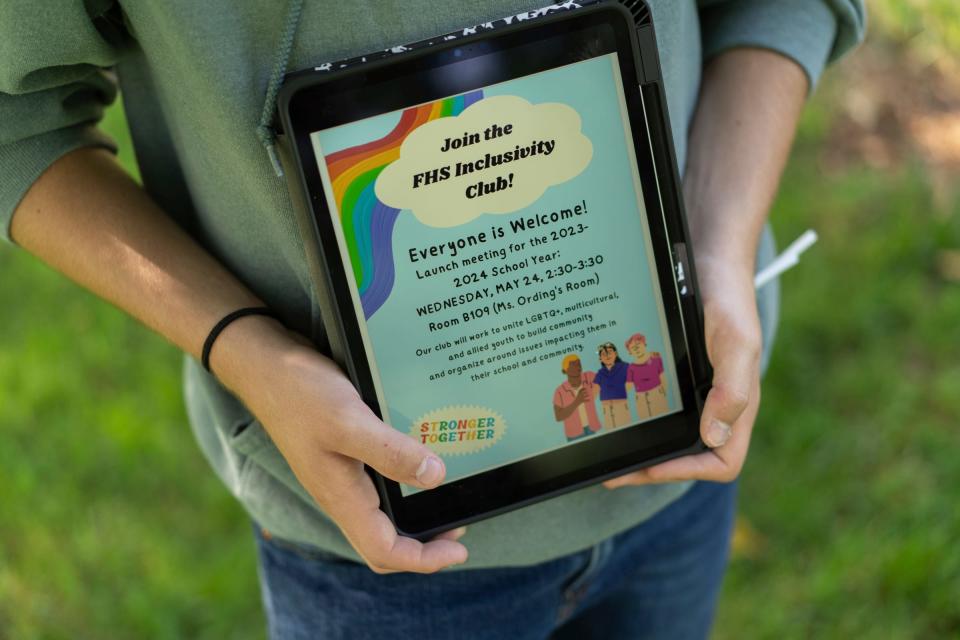LGBTQ+ students feel erased as school boards ban pride flags in rural districts
The posters declared, "Everyone is Welcome!"
Laminated, with rainbow billowing across the top right corner and three cartoon people in a friendly embrace in the bottom left, the poster advertised the launch of Fowlerville High School's inclusivity club. The club was a space meant to "unite LGBTQ+, multicultural, and allied youth" to form a stronger sense of community.
But unity felt faraway at Fowlerville High to some LGBTQ+ students, where schoolmates tore the inclusivity club's posters down, said Gavin Tschirret, 17, who graduated from Fowlerville High in the spring.

At Fowlerville, Tschirret and others said they felt as if some district forces were trying to cram them back into the closet, especially as the so-called culture wars seeped into their daily lives at school. This summer, Fowlerville's school board banned flags and displays at schools not deemed "content neutral," effectively nixing pride flags and displays.
Michigan families across the state said that the impact of the controversies recounted in national headlines has trickled into their homes and classrooms. The controversies have more often flared in rural and suburban communities rather than in city districts. Students said they feel that board members voting on issues, such as banning pride flags or limiting books with gay characters in the library, minimize the impact they feel as new rules are enforced.
A November 2022 study out of the University of California found that 48% of high school principals reported conflict in school over policies and practices related to LGBTQ+ student rights.
The inclusivity club's posters will still be allowed under the new policy, Superintendent Matt Stuard wrote in an email. But Tschirret, who uses they/them pronouns, is still concerned about other displays.
"If we didn't have these symbols of strength, or pride, how many of us would be still stuck in the closet?" they asked.
The consequences of such votes across Michigan appear to be mounting: At least two school districts, Hartland and Fowlerville, have moved to ban displays of pride, including "safe space" stickers and rainbow flags, according to local news reports. In rural Grant, on the west side of the state, a school board pulled its contract with an organization that runs a health center at a district middle school following an uproar over a mural featuring the trans flag colors and a rainbow, though board members gave other reasons for pulling the health center contract.
Elizabeth Ording, a high school English teacher in Fowlerville, between Lansing and Detroit, said kids who feel marginalized by society are more likely to struggle to show up to school at all. And messages that they're welcome, like safe space stickers just banned by her district's board, can make a difference.
"Any teacher who has a little pride flag or a little sticker in their classroom is just trying to show students that they're valued and welcomed," Ording said. "I guess I don't see any reason why we wouldn't want teachers to send those messages to kids."
Symbolism front and center in school debates
A Fowlerville student who is an involved member of her school's inclusivity club said she knew she was a lesbian in sixth grade. Her parents were accepting, but some of her peers in Fowlerville schools were not, she said.
Holding her girlfriend's hand one day when she was a sophomore in high school, another student told her to "go kill herself," she said. She asked the Free Press to withhold her name out of concerns around safety. She will be a senior next school year.
"I was really scared about talking about my sexuality," she said.
Fowlerville's policy, similar to the one passed in Hartland, limits schools to displaying only Michigan flags, school flags, displays that are relevant to a unit of study, displays celebrating an achievement with the approval of the superintendent, athletic displays, college or university displays, flags of countries representing foreign exchange students, and displays representing student organizations.

Amy Sova, president of Fowlerville Community Schools, shared a statement from the school board over email.
"The Policy strives to ensure these displays are content-neutral, align with the district's educational objectives, and support the approved curriculum and other school activities," she wrote.
But some parents, students and LGBTQ+ advocates in communities fear there is a larger agenda behind these policies, one that marginalizes LGBTQ+ students and undermines their sense of safety at public schools.
"They're using these culture wars to tear down our public schools," Julie Ohashi, a parent in the Hartland School District, said. "They're trying really hard to stoke that fear and sow the doubt. It's all manufactured outrage just to further their agenda."
Jay Kaplan, attorney for the American Civil Liberties Union of Michigan's LGBTQ+ program, said school districts are within their rights to display pride flags and other imagery that might create a safe and supportive environment for marginalized students. Removing those items could send a harmful message.
"When they buckle, which is happening a lot of times because there's complaints about things, unwittingly or maybe purposely," he said, "they're sending a message to those LGBTQ students once again, that somehow to acknowledge them is something bad."
More: Jim Harbaugh losing moral superiority, but not the core of Michigan football fan base
More: U.S. Coast Guard rescues 5 from boat fire at Pictured Rocks National Lakeshore
Dave Kallman, a conservative Lansing attorney who represents multiple school boards in Michigan, disagrees, arguing such policies aim to be neutral in content.
"They're being neutral to everybody, because we're not going to promote anybody's groups, because that's not our job," Kallman said. "We have to represent everybody ... and I think it's a little disingenuous for some of these folks to be portraying it as anti-gay pride."
In January, Kallman's law firm was at the center of a debate at a board meeting in Allendale Public Schools in west Michigan, when board members wanted to switch from a different firm to Kallman. Board members affiliated with Ottawa Impact, a far-right group targeting key locally elected political positions in Ottawa County to promote conservative policies, successfully voted to be represented by Kallman, who is known for his work with the Great Lakes Justice Center. Opponents believe some school boards are attempting to drop their existing legal counsel to hire Kallman to help push conservative and anti-LGBTQ+ policies.
Issues extend to books, bathrooms
When another parent in Jenison Public Schools began circulating a "graphic" email about the danger of having transgender students use their chosen bathroom, Liz and Drew felt like they were being targeted. The Free Press is not using their last name to conceal the identities of their young children. Liz and Drew are the parents of two children in Jenison schools, one of whom is transgender and felt the subject of the email was their child.
In the email shared with the Free Press by Liz and Drew, the person who identifies themselves as a fellow Jenison parent writes that "there's a boy pretending to be a girl" at school and that while "there are plans to build one single room bathroom in the hall," legally they can't force the child to use it.
"Which means for the next four school years, there will likely be a biological boy with a penis sharing the girls community bathroom," they wrote.
The district sidestepped the issue, Liz said, by building a single stall bathroom in her child's school, even though their child hadn't had an issue before using the bathroom of their choice.
"It was presented as a solution to a problem that didn't exist from our side," Drew said.
Peter DeGraaf, a spokesman for the school district, wrote in an email that the district does not comment on individual student situations, but that generally district officials have consulted legal counsel around transgender bathroom questions and "believe we are following the law."
One video from a Jenison school board meeting shows Donna Mooney, a member of the board, asking about the state Elliott-Larsen Civil Rights act, which was expanded in March to protect LGBTQ+ Michiganders from discrimination. Mooney asks an attorney in the meeting if the board is "able to do anything to keep biological males out of the female bathrooms." The attorney responds that transgender students have the right to use the bathroom of their choice.
Mooney declined to provide a comment when asked about the statement, because, she wrote in an email, that the board only makes statements as a collective. DeGraaf said that statements made by individual board members don't represent the district as a whole.
At board meetings, Liz said she has sensed fear — fear she believes is unfounded — about transgender individuals that ends up antagonizing her child and other LGBTQ+ children.
"I think they shouldn't just assume who I am," said Liz and Drew's child.
Robin, a transgender student at Hartland High School who asked that we only refer to her by her first name, said that she began to transition during the pandemic, when school was virtual. That made the transition at school a little easier, she thinks, but what wasn't easy was gym class, where she was forced to use a different bathroom to change, rather than the locker rooms. She had to use the stairs to get to that bathroom just to change for the class.
"It felt really uncomfortable to do anything in gym," she said.
Kaplan also said he's seeing efforts across the state in districts and public libraries to ban and remove books that include LGBTQ+ characters or content. For example, a superintendent at Forest Hills Public Schools apologized after removing books featuring LGBTQ+ characters, a local TV station reported. Kaplan's team at the ACLU is working to investigate what's happening and why some books are being taken off the shelves without following policies.
"We're seeing ... at local school districts, school boards, superintendents, buckling under this pressure from certain members of the school district community, wanting to censor items," he said.
In Fowlerville, the student who was told to "kill herself" while holding her girlfriend's hand said that some of her fear over being targeted for being a lesbian eased when she noticed that one of her teachers had a pride flag in his room. She felt like she could talk to that teacher, she said.
"I don't think I would be where I am now if I hadn't been able to go to him," she said.
Next year, under Fowlerville's new policy, that flag could be gone.
Free Press staff writer Dave Boucher contributed to this report.
Contact Lily Altavena: laltavena@freepress.com.
This article originally appeared on Detroit Free Press: Michigan school districts in rural, suburban areas ban pride flags

